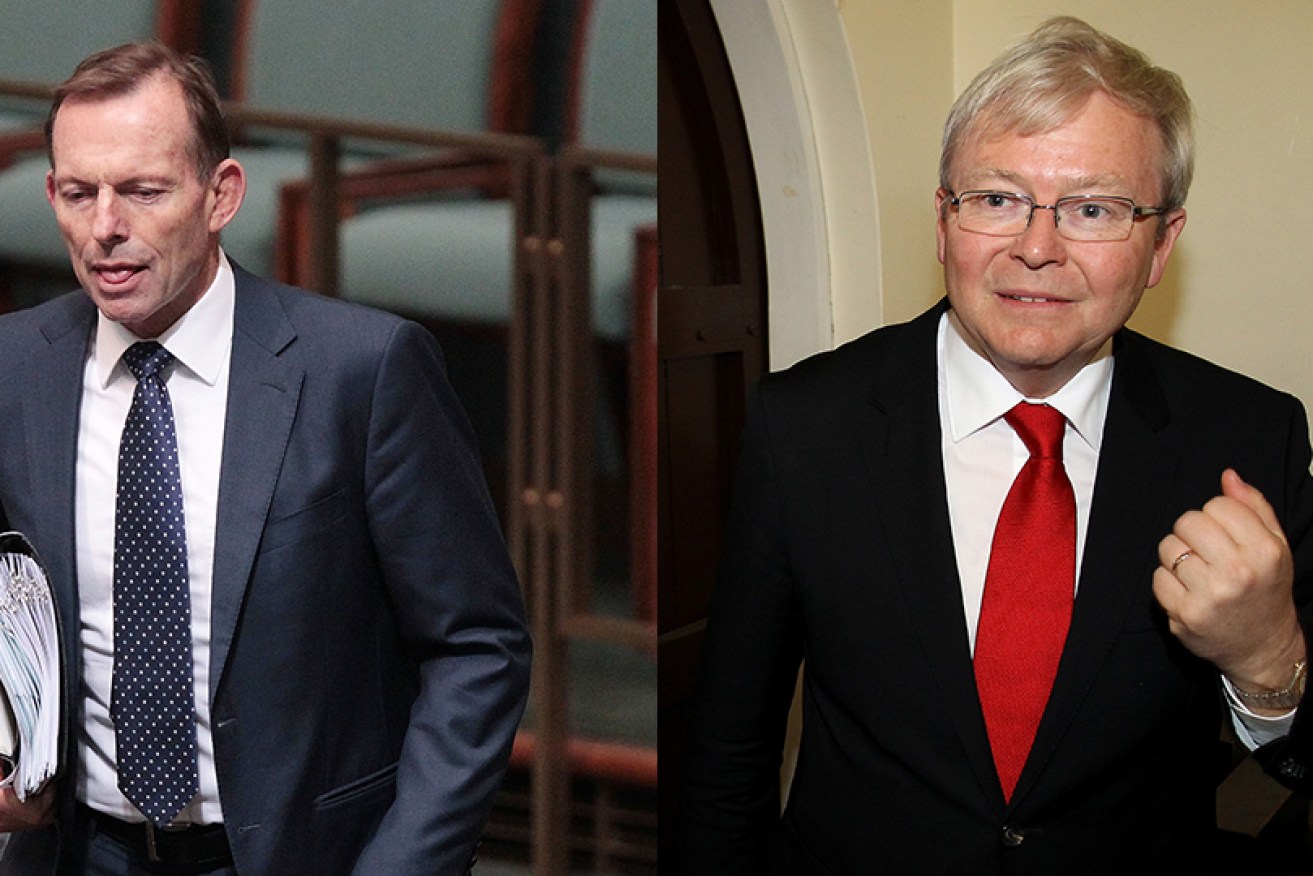Budget 2019: A surplus? We’ve heard that before, Paula Matthewson writes


Former prime ministers Tony Abbott and Kevin Rudd have both been caught out by surplus promises. Photos: Getty
Whether we like it or not, Australian voters will be hearing a lot about the budget surplus in the weeks to come.
Why? Because we’re about to be flung headlong into a five-week federal election campaign – and one of the few things left in the Morrison government’s political favour is the claim that it will have ‘repaired’ Labor’s debt-and-deficit disaster by returning the budget to surplus in just over a year’s time.
Or brought it ‘back in black’ as the PM’s try-hard social media feed would like us to think.
The problem with this approach is that a lot of voters will be asking, ‘What’s a budget surplus and why should I care?’
The issue might be Economics 101 to most people who closely follow politics, but the vast majority of voters have better things to do with their time.
In short, a budget has a surplus if it spends less money than it collects from taxpayers.
The opposite situation produces a budget deficit, where the government spends more than it collects and has to borrow money to meet the difference.
The money the government has borrowed to meet spending commitments is the national debt.
Voters who were around during the John Howard years would remember the prime minister and his treasurer, Peter Costello, made a big deal of having a budget surplus for nearly every year they were in government.
They claimed this was due to superior economic management, but the surplus was due in large part to the flood of taxes paid by highly profitable resource companies during the mining boom.
Initially the Howard government used the surplus money to pay off the national debt inherited from the Hawke and Keating Labor governments.
Then, when mining company taxes continued to flow into Treasury coffers, the government started throwing money at middle-class taxpayers in the hope of staying in their good books.
This worked well until Mr Howard’s opponent Kevin Rudd turned the PM’s economic bounty against him, with the Labor leader convincing voters that “this reckless spending must stop!”
Yet Mr Rudd had to change his tune when the Global Financial Crisis hit in 2008.
He and his treasurer, Wayne Swan, spent tens of billions of dollars on a range of initiatives, including building roads and school halls and giving cash handouts to voters, in the hope of keeping the economy afloat.
This unexpected spending put the Labor government’s budget into deficit, where it stayed for the rest of the Rudd-Gillard-Rudd years, thanks to the end of the mining boom and the impacts of the sluggish world economy.
Three years in a row, then-treasurer Mr Swan promised a surplus was within reach but was unable to deliver on that vow.

Former treasurer Wayne Swan’s promised surplus turned out to be anything but. Photo: ABC
The most famous of those budget commitments occurred in 2012 when Mr Swan told Parliament, “The four years of surpluses I announce tonight are a powerful endorsement of the strength of our economy.”
Labor’s promised $1.5 billion surplus the following year turned out to be an $18.8 billion deficit instead, while the one after that blew out to $43.7 billion.
We can expect to hear a lot about that speech and Labor’s ‘debt and deficit disaster’ – as Tony Abbott liked to call it when he was Opposition leader – in the election campaign to come.
While Mr Abbott and his treasurer Joe Hockey tried to plot a return to surplus with a slash-and-burn budget in 2014, they were unable to get most of the unfair measures through the Senate.
This misjudgement doomed both Abbott-Hockey budgets (yes there were only two) to deficits that were larger than promised and not much less than the one inherited from Labor.
However the ‘budget repair’ task has become easier for Mr Abbott’s successors as the global economy has begun to pick up again and the Australian resources sector has increased activity (and paid more tax) in response.
And even with modest income growth, some everyday Australians have also been contributing more tax as they move into higher income tax brackets.
This brings us to this year’s budget.
It should be noted that even though a surplus may be announced on budget night, the actual number is not known until after the end of the financial year.
For all its talk of being ‘back in black’, we won’t know if the Morrison government has actually delivered on this undertaking until the second half of next year.
This means all the talk that we’ll hear during the election campaign about the surplus being a sure thing and the Coalition ‘still’ being superior economic managers, is nothing more than that – simply talk.
An even bigger unknown, however, is whether a surplus has the same politically iconic value that it had during the Howard and Abbott years.
The concept may have lost power given neither the Coalition nor Labor has produced a surplus budget in the past 10 years, despite one being promised many times.
The Coalition also stopped describing debt and deficits as a disaster once Mr Abbott experienced how hard they were to ‘repair’.
And voters of all persuasions have become comfortable with governments spending money when it is to improve valued services, such as health, education and aged care or build infrastructure.
Nevertheless, opinion polls suggest that voters still do see the Coalition as better economic managers, by a significant margin over Labor.
The question is whether news of a budget surplus, combined with that perception, will shift votes to the Coalition (which is what the government desperately needs).
It might not sway voters if they don’t care about the state of the budget – as long as important services are being funded.
There is also the distinct possibility that voters have simply stopped listening to the government, or aren’t inclined to give the Coalition any additional credit for just doing its job – that is, being economically competent.









